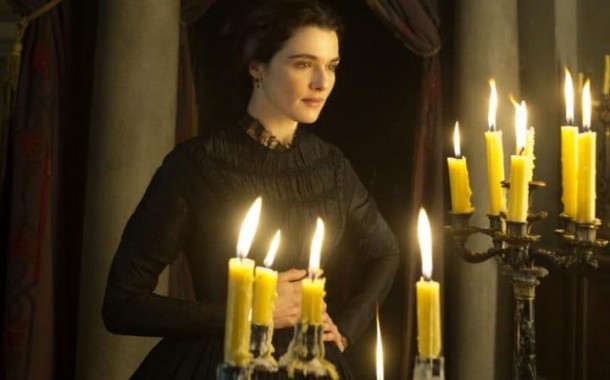
Writer|Dir: Roger Michell | Cast: Rachel Weisz, Sam Claflin, Holliday Grainger, Iain Glen, Pierfrancesco Favino, Simon Russell Beale, Vicki Pepperdine, Poppy Lee Friar, Katherine Pearce, Tim Barlow | 110min | Drama
Rachel Weisz plays the enigmatic heroine in this rather subdued adaptation of Daphne du Maurier’s Gothic romance, with Sam Claflin as the naive country boy who falls under her power, completely misjudging the mood. The 1951 novel was first adapted for the big screen a year after its completion with Nunnally Johnson and Henry Koster brilliantly capturing the sinuous mystery, and giving a chilling sense of spiteful danger that this version fails to convey, despite its lavishly atmospheric mise-en-scene and an unsettling denouement for the impressive cast. Performance-wise, Olivia de Havilland and Richard Burton were always going to be a hard act to follow but chemistry certainly smoulders between Claflin and Weisz’s Rachel, although she comes across as coldly reticent rather than alluringly mysterious, and by the end we are glad to be done with her.
In 1830s England, Sam Claflin is warm and exuberant as Philip Ashley, the fresh-faced orphan who “knows nothing of women”, growing up in his cousin Ambrose’s Cornish manor. Unsophisticated and puppyish, he is close to his godfather’s English rose of a daughter Louise (Holliday Grainger) but they lack the erotic charge to be more than friends. Philip idolises Ambrose (who he also plays) and compressed opening scenes show them enjoying outdoor pursuits, in shades of Schlesinger’s Far From The Madding Crowd. Come the winter, Ambrose heads for Italy for his health and finds love with his cousin Rachel, extolling their happiness and marriage in letters back home. But clouds soon gather over their idyll as a note of suspicion, then terror, enters his correspondence, and his “kindest companion” soon becomes “my torment”. And when Philip arrives in Florence to offer support, the mysterious Rainaldi is waiting to tell him that Ambrose is dead from a brain tumour, and Rachel is heading for Cornwall.
Devastated and angered, Philip hot foots it home on a mission of revenge. There, Rachel’s urbane grace disarms him, inviting him to tea, demurely dressed in black, eyelashes ‘a flutter. She is captivated by his strong resemblance to her dead husband, but after a tepid boudoir encounter, he clearly proves to be a pale imitation of the real man, both in and out of the bedroom. From then on Rachel turns to mind games rather than sexual ones, becoming the châtelaine and ordering refurbishments to the shabby decor. This is a household devoid of women so naturally Rachel goes down a treat, even the crusty old retainer Seecombe (Tim Barlow) fumbles more that usual over the tea things. There are open references to Rachel’s ‘unlimited appetite’ from her snivelling house guest Rainaldi, but the only appetite in evidence is her profligacy as a black hole appears in the family finances, and she comes across as simpering, inscrutable and histrionic when challenged, rather than bewitching or seductive. Philip enters a vortex of jealous obsession over Rainaldi (who is later revealed as gay) and rashly signs over his entire inheritance to the object of his desire in a wonderfully played cameo by Simon Russell Beale as his stickler of a lawyer (It’s my job, to stickle”) and rather a twee scene where his godfather (a dignified Iain Glen) plays the harpsichord, on the verge of tears.
Our trust lies in these erudite elders to save the day, but the recalcitrant Philip will have none of it, as the post-coital narrative gains melodramatic momentum driven forward by his stonking lust, Rachel’s ambiguity, and the legal twists and turns. Ambrose’ letters hinted at Rachel poisoning him and Philip discovers laburnum seeds amongst her possessions, while her specially brewed twig teas drive him, quite literally, to delirium, in scenes of woozy magic realism. During a bosky interlude in the bluebells, she again grimly tolerates Philip’s sexual advances, while later claiming to be a liberated female whose emancipation has somehow been challenged by his prescient announcement of their betrothal. It’s clear as the family crystal that Philip has been making advances, so why was she unable, despite her feminist pretensions, to signal her feelings of doubt – or distaste – before his clumsy announcement. Eventually we too become confused by their dalliance. She owns the house, so what is her game plan, if not marriage? She clearly doesn’t appreciate his lovemaking and yet continues to hang around the house titivating and forcing toxic tisanes on the reluctant household, and makes flirtatious sorties to see her Italian friend. Clearly the film’s feminist agenda has been lost in translation somewhere between the 19th and the 21st century. But still our heroine continues to exert a subtle suspense. A very timely film for today where certain women seem stuck in the dark ages while desperate to enjoy the privileges offered by the modern world. MT
OUT ON 9 JUNE 2017